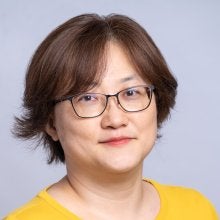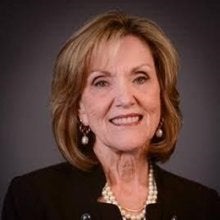

Teaching and Learning, Policy and Leadership - Teacher Education and Professional Development Specialization, Ph.D.
This program offers a PhD in Teaching and Learning, Policy and Leadership, with a specialization in Teacher Education and Professional Development.
Great schools thrive on the foundation of great teachers. To cultivate such schools, we must focus on preparing teachers to excel, which is the mission of teacher educators.
As the teaching profession evolves with more sophisticated ideas about high-quality education, the complexity of teacher education also increases. Teacher educators are responsible for preparing pre-service and in-service teachers for equitable and justice-oriented practices.
To personalize your educational journey, you are encouraged to collaborate with your advisor and tailor your coursework to your interests. You also invited to take courses from other specializations within the Department of Teaching and Learning, Policy and Leadership:
- Education Policy and Leadership
- Language, Literacy, and Social Inquiry
- Mathematics and Science Education
- Urban Education
- Technology, Learning, and Leadership
- Apply cutting edge research methods to better understand and solve problems in today’s educational environments
- Examine the interplay between teacher development, student learning, teacher leadership, curriculum, and school improvement
- Appreciate the impact of the sociopolitical contexts on teacher education and professional development
- Explore and develop humanizing and equity-oriented pedagogies across various subjects, including preparation for teaching multilingual and special needs students
- Understand, critique, and generate scholarship on teacher learning for minoritized and underserved populations in urban schools
Information on admissions and application to this program can be found on the University Graduate Admissions website and the program handbook.
On average, our program takes at least four years to complete. Most students admitted to the doctoral program already have a master’s degree. If you have a master’s degree, you will take a minimum of 60 credits. If you do not have a master’s degree, you will take a minimum of 70 credits and work with your advisor to develop an individualized plan that seamlessly blends master’s level and doctoral level coursework.
You are expected to fully immerse yourself in the academic community. The curriculum consists of the courses listed below.
All full-time students in a Ph.D. program in the Department of Teaching and Learning, Policy and Leadership complete a two-course sequence of core, integrated foundational courses.
- TLPL 794: Foundations of Educational Inquiry I ("Core I")
- TLPL 795: Foundations of Educational Inquiry II ("Core II")
Students are required to take research methods courses, including one qualitative and one quantitative methods course. Students may take additional research methods courses offered by the College of Education or other academic departments across campus.
Though not an exhaustive list, some example courses are below:
- Qualitative (at least 1 course)
- TLPL 790: Seminar in Mixed Methods Research in Education
- TLPL 791: Qualitative Research I: Design and Fieldwork
- TLPL 792: Qualitative Research II: Analysis and Interpretation of Data
- TLPL 860: Seminar on Case Study Methods
- TLPL 762: Phenomenological Inquiry I
- TLPL 763: Phenomenological Inquiry II
- Quantitative (at least 1 course)
- EDMS 646: Quantitative Analysis II
- EDMS 651: Applied Regression Analysis
- EDMS 657: Factor Analysis
- EDMS 722: Structural Modeling
- TLPL 765: Quantitative Applications for Education Policy Analysis
- TLPL 788 X: Special Topics in Education: Cost Analysis
- TLPL 790: Seminar in Mixed Methods Research in Education
- SURV 699K: Multilevel Analysis of Survey Data
Students complete in-depth study and training in courses tailored to their individual interests and aligned with their chosen specialization area. Candidates take at least 9 semester hours in TEPD. An additional 21 semester hours (typically seven courses) is selected in consultation with the advisor. These courses generally take the form of doctoral seminars taught by program faculty and may include doctoral level courses from other departments.
Specialization Core (9 credits)
- TLPL 771: Pedagogy of Teacher Education
- TLPL 772: Teaching, Professional Development, and School Change
- TLPL 788: Teacher Cognition
Electives (21 credits)
Students work with their advisor to develop a program of study that includes at least one teacher education-focused course in another TLPL specialization, or another department in the College of Education.
Before embarking on collecting and analyzing data for a dissertation, PhD candidates need to submit a dissertation proposal. The most standard format for a proposal is to write it as the first three chapters of your dissertation. Chapter 1 is an introduction, Chapter 2 is a literature review and theoretical framework, and Chapter 3 is the research methods. PhD students should work with their advisor and their dissertation committee to decide on the format that makes the most sense.
Students must complete comprehensive exams before starting their dissertation research. Students typically begin their exams near the end of their second year or beginning of their third year.
Doctoral students may enroll in the TEPD (or other) one-credit seminar with other students in their area of focus to explore topics of interest with faculty and other students, develop their knowledge of the field, explore policy issues that pertain to the field, and apprentice into the broader research community.
We encourage you to get in touch with any of the following faculty members who have an interest in teacher education and professional development, and are also affiliated with another specialization:
Faculty
- Keisha Allen (she/her/hers): Education Policy and Leadership
- Megan Madigan Peercy (she/her/hers): Language, Literacy, and Social Inquiry
- Donna Wiseman (she/her/hers): Language, Literacy, and Social Inquiry
Affiliated Faculty
- David Blazar (he/him/his): Education Policy and Leadership
- Andrew Brantlinger (he/him/his): Science, Technology and Mathematics Education
- Daniel Chazan (he/him/his): Science, Technology and Mathematics Education
- Daniel Levin (he/him/his): Science, Technology and Mathematics Education
- Sarah McGrew (she/her/hers): Technology, Learning, and Leadership and Social Studies Education
- Janet Walkoe (she/her/hers): Science, Technology and Mathematics Education

